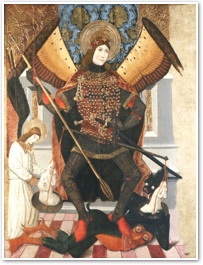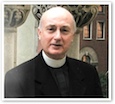Chronological snobbery and Catholic Faith
- FATHER GEORGE W. RUTLER
Nostalgia is a selective editing of the past.
 For instance, there are those who wish we had today some of the architects of thirteenth-century cathedrals, but who avoid mentioning thirteenth-century dentists. In recent times, the general conceit has been the opposite of nostalgia. The philosopher Owen Barfield spoke of "chronological snobbery," defined as the belief that "intellectually, humanity languished for countless generations in the most childish errors on all sorts of crucial subjects, until it was redeemed by some scientific dictum of the last century."
For instance, there are those who wish we had today some of the architects of thirteenth-century cathedrals, but who avoid mentioning thirteenth-century dentists. In recent times, the general conceit has been the opposite of nostalgia. The philosopher Owen Barfield spoke of "chronological snobbery," defined as the belief that "intellectually, humanity languished for countless generations in the most childish errors on all sorts of crucial subjects, until it was redeemed by some scientific dictum of the last century."
That snobbery had its heyday in the past generation, which defined itself as mankind finally "come of age." Were that true, we should now be in the stage of incipient senility. Catholics are suffering from that period's destructive arrogance. Just look at the circular churches and ugly music that replaced venerable shrines and chants. Characteristic of that polyester period was the underestimation of evil, which Pope Benedict XVI noticed even in some assertions of the Second Vatican Council. Without explanation, the Prayer to Saint Michael was dropped from the liturgical books in 1964. But "Satan and all the evil spirits" have not politely gone away.
That prayer was promulgated by Pope Leo XIII in 1884. Accounts variously claim that he was inspired by a vision of horrors to come in the twentieth century. Its use remained a private option after recitation of the prayer was dropped from the end of Mass, but in 1994 Pope Saint John Paul II, from his experience of travails in his native Poland, was not inclined to underestimate the power of the wickedness and snares of the devil: "I invite everyone not to forget it, but to recite it to obtain help in the battle against the forces of darkness and against the spirit of this world."
Far from having "come of age," chronological snobs have learned the hard way that theirs has been a prolonged adolescence. In our present cultural chaos, faced with moral decadence all around, the pope and bishops have asked that the Prayer to Saint Michael be restored at the conclusion of each Mass. In our parish we have not had to reinstate it because we never ceased to offer that prayer after Mass, sometimes to the consternation of a few who thought it retrograde. When the Barque of Peter is tossed by storms, it is time to bring the life jackets out of the storage where some liturgists hid them.
Our church is providentially dedicated to Saint Michael, and a month ago the Catholic News Service published a photograph of our own statue of him, based on the famous painting by Guido Reni. Generations ago, the people of "Hell's Kitchen" knew that Michael and his sword would be a better defense in battle than liturgical dancers and the balloons of chronological snobs. They also knew, as Baudelaire said, that "The devil's greatest trick is to persuade us that he does not exist."
 This is Meaghen Gonzalez, Editor of CERC. I hope you appreciated this piece. We curate these articles especially for believers like you.
This is Meaghen Gonzalez, Editor of CERC. I hope you appreciated this piece. We curate these articles especially for believers like you.
Please show your appreciation by making a $3 donation. CERC is entirely reader supported.

Acknowledgement
 Father George W. Rutler. "Chronological snobbery and Catholic Faith." From the Pastor (November 4, 2018).
Father George W. Rutler. "Chronological snobbery and Catholic Faith." From the Pastor (November 4, 2018).
Reprinted with permission from Father George W. Rutler.
The Author
 Father George W. Rutler is the pastor of St. Michael's church in New York City. He has written many books, including: The Wit and Wisdom of Father George Rutler, The Stories of Hymns, Hints of Heaven: The Parables of Christ and What They Mean for You, Principalities and Powers: Spiritual Combat 1942-1943, Cloud of Witnesses — Dead People I Knew When They Were Alive, Coincidentally: Unserious Reflections on Trivial Connections, A Crisis of Saints: Essays on People and Principles, Brightest and Best, and Adam Danced: The Cross and the Seven Deadly Sins.
Father George W. Rutler is the pastor of St. Michael's church in New York City. He has written many books, including: The Wit and Wisdom of Father George Rutler, The Stories of Hymns, Hints of Heaven: The Parables of Christ and What They Mean for You, Principalities and Powers: Spiritual Combat 1942-1943, Cloud of Witnesses — Dead People I Knew When They Were Alive, Coincidentally: Unserious Reflections on Trivial Connections, A Crisis of Saints: Essays on People and Principles, Brightest and Best, and Adam Danced: The Cross and the Seven Deadly Sins.




